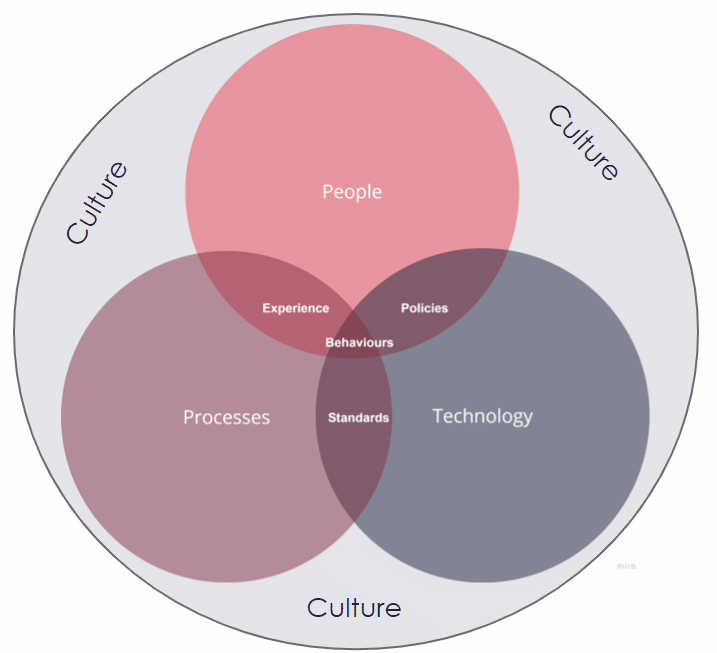An F1 team could have the fastest, most reliable car out of all the other teams in the line-up – the technology being used is cutting edge, something other teams are yet to adopt or invest in. Unfortunately, despite having this technological advantage, the F1 team boss has failed to look at his driver (People) or the strategy (Process) to win the race.
Having bypassed People and Process, the team is stuck with an inexperienced driver and, as if this were not bad enough, an inexperienced pit crew. There is no clear direction on what the plan is for the race or pit stops, and this impacts team morale as they are no longer striving towards the same plan or vision for winning the race.
It seems so obvious in this example – you would never buy or heavily invest in the best Formula 1 car in the world before you have the correct people to drive and maintain it, just like you’d never start a race without a strategy in place to ensure the team is aligned and the vision is set.
Many of you will be familiar with the above “PPT” approach, and using this Formula 1 analogy, you can see why it is crucial to get people involved early on and the reasons why in this well-known methodology, but what does this mean in terms of Data Governance?
When starting a Data Governance journey, you can get your business on board and get quick buy-in by starting with the people. Doing it this way can avoid wasted tech spend, identify value, adapt to the business’s culture, and get more people managing your data at minimal extra cost.
When we focus on data, our first instincts tend to draw us to think about technology because this often seems like the easiest solution, and in a world where technology seems to run everything, why not expect it to be that silver bullet to solve all our data governance needs too?
However, This focus on tech masks the true root causes of our issues, which often lie in our people, processes, and culture.
For those who do not know, the PPT framework has existed since the early 1960s, building on the idea that people are a fundamental, foundational, and critical part of an effective management approach in business.
Our take on PPT in Data Governance? – add one more element after People… Culture.
“People, Culture, Process, Technology”

Data Governance
By adding “Culture” to the widely known PPT methodology, this framework now encompasses the basics for any successful Data Governance initiative.
What is Data Culture?
This topic can often be complicated, but how do you start to create a culture that values data?
- First, you need to set the expectation that all decisions should be underpinned by insight and facts drawn from data.
- Secondly, perceptions surrounding data need to be reshaped. Data is not just for reporting; it is a strategic tool that can reduce costs and drive revenue when utilised.
We like to think of data culture as the collective behaviours and beliefs of employees who share a mutual understanding of enterprise data and use data in their roles to help make better decisions and improve operations. Having a data culture promotes an inclusive and empowering community approach to use and understand the value of data within a business.
Effective data governance requires the active participation and collaboration of people from different departments, levels, and functions within an organisation. It involves defining policies, processes, and procedures to manage data quality, security compliance, and privacy. However, these policies and processes are created and executed by people who also use, analyse, and provide feedback on the data. Without people’s engagement and buy-in, data governance efforts can and do, fail, or remain incomplete, leaving gaps in data management and increasing the risk of errors, inefficiencies, and the loss of trust in data. Involving People in data governance initiatives, including training, communication, and incentives, is critical to achieving a sustainable, impactful data governance outcome.
Here are just a couple of reasons why people are crucial to data governance:
People create and use data while setting the data culture within an organisation.
Think of Data Owners and Data Stewards as the champions of Data Governance within an organisation. They are the “knowledge keepers,” the “Quality Inspectors,” the “approachable gatekeepers,” and the “Change agents.” All these roles will be critical to setting the data culture within an organisation.
Data is generated, stored, and processed by people and used to support decision-making by people – in other words, without people, you do not have a business in the first place. People have the most direct impact on data quality, consistency, and accuracy. Through training, education, and communication, people will be empowered to follow data governance policies, appropriately use data, and contribute to quality improvement initiatives.
People provide feedback on data quality.
Data governance relies on people’s feedback to identify data quality issues, including errors, inconsistencies, or missing data. Data users can provide input on the data’s relevance, accuracy, and completeness, which helps data stewards and owners improve and maintain data quality standards. This list includes security and privacy protocols, legal and regulatory compliance, and alignment of data management practices with business goals.
At Oakland, we pride ourselves on doing the right things in the right way.
We don’t offer a one size fits all Data Governance solution, or a technology focussed solution, because we have seen all too many times DG tools so complicated they sit unused and unloved. Data Governance is not an off-the-shelf package. It requires engagement with people at all levels to understand the business, industry, and the problems and pain points being faced.
We can design a bespoke approach with people at its heart with this understanding.
People, Culture, Process, Technology.
So as we’ve seen, People are first for a reason; to embed culture, we need our people to adopt and drive the initiative forward. Get this right, and we have the right foundations to deliver a successful Data Governance initiative.
Mat Wilde is a Senior Data Governance Consultant at Oakland

